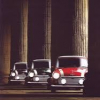Weber 40's ?
#1

Posted 01 September 2009 - 08:34 PM
My Engine is a 1275 with dished powermax pistons fast road cam highlift rockers etc.
Does anyone have the right jetting numbers so that i can check when i have it in my hands.
Thanks
#2

Posted 01 September 2009 - 10:55 PM
#3

Posted 02 September 2009 - 01:31 AM
That's nonsense. A 40 will work fine on a road 1275. However, if you plan to eventually graduate to a 1380 or build a full-on road screamer 1310 or 1340, then you may need to run a 45.A weber 40 is really too small for a 1275 engine - it will run, but you won't get the very best performance. The chokes/jetting won't be too far away (if they were ever correct for the other engine !!) - do you know what's in it at the moment ?
Until then, as long as you already have a 40, why not try it out and see what you think. Most of the components(main jets, air correctors, etc.) are interchangeable between 40s and 45s.
Assuming that your source for the 40 had his running pretty well due to its being tuned close to what his 1340 engine required, you may have to "downsize" the carb with smaller chokes,smaller mains, bigger airs, leaner idle jets, etc. for it to run correctly on your smaller, milder engine.
You can take a look at the Vizard "bible" or the Des Hammill Weber book for jetting recommendations, but those are just the authors' rough estimates. Don't assume that they are proven by dyno tests.
You would be much better off checking what your 1340 friend was running and how well his engine ran. You should also try to run an intake manifold like his if it will fit into your car. If his engine was running well, you might get good results by "downsizing" his settings and then getting your car on a rolling road to have it tuned properly by an expert. You should also have your distributor's advance curve evaluated and, if necessary, modified to optimize it for your engine's requirements. If you think it's expensive to get on the rollers, consider the amount of money you can waste by buying/trying different sizes of the many Weber components that you can change while tuning a Weber DCOE.
Be careful not to use chokes that are too big. Vizard states in his book that you will hurt engine performance more from using chokes that are too large than from using chokes that are too small. Part of the reason why Webers get a bad reputation in some quarters is that people fit them with chokes that are too large combined with jets that are too rich. Then they complain when the engine is lazy and burns a lot of fuel. Better to get it tuned on the rollers, along with your dizzy, and then you'll have a sharp running engine that will be great to drive.
Try to see if someone you know, or can get to know, runs a Weber on an engine somewhat close to yours. That may give you some ideas about what you need for a carb and jetting.
Edited by mini7boy, 02 September 2009 - 01:33 AM.
#4

Posted 02 September 2009 - 09:17 AM
That's nonsense. A 40 will work fine on a road 1275. However, if you plan to eventually graduate to a 1380 or build a full-on road screamer 1310 or 1340, then you may need to run a 45.A weber 40 is really too small for a 1275 engine - it will run, but you won't get the very best performance. The chokes/jetting won't be too far away (if they were ever correct for the other engine !!) - do you know what's in it at the moment ?
Until then, as long as you already have a 40, why not try it out and see what you think. Most of the components(main jets, air correctors, etc.) are interchangeable between 40s and 45s.
Assuming that your source for the 40 had his running pretty well due to its being tuned close to what his 1340 engine required, you may have to "downsize" the carb with smaller chokes,smaller mains, bigger airs, leaner idle jets, etc. for it to run correctly on your smaller, milder engine.
You can take a look at the Vizard "bible" or the Des Hammill Weber book for jetting recommendations, but those are just the authors' rough estimates. Don't assume that they are proven by dyno tests.
You would be much better off checking what your 1340 friend was running and how well his engine ran. You should also try to run an intake manifold like his if it will fit into your car. If his engine was running well, you might get good results by "downsizing" his settings and then getting your car on a rolling road to have it tuned properly by an expert. You should also have your distributor's advance curve evaluated and, if necessary, modified to optimize it for your engine's requirements. If you think it's expensive to get on the rollers, consider the amount of money you can waste by buying/trying different sizes of the many Weber components that you can change while tuning a Weber DCOE.
Be careful not to use chokes that are too big. Vizard states in his book that you will hurt engine performance more from using chokes that are too large than from using chokes that are too small. Part of the reason why Webers get a bad reputation in some quarters is that people fit them with chokes that are too large combined with jets that are too rich. Then they complain when the engine is lazy and burns a lot of fuel. Better to get it tuned on the rollers, along with your dizzy, and then you'll have a sharp running engine that will be great to drive.
Try to see if someone you know, or can get to know, runs a Weber on an engine somewhat close to yours. That may give you some ideas about what you need for a carb and jetting.
LOL glad to see you learning calver:
http://www.theminifo...x...=weber&st=0
#5

Posted 02 September 2009 - 09:55 AM
That's nonsense. A 40 will work fine on a road 1275. However, if you plan to eventually graduate to a 1380 or build a full-on road screamer 1310 or 1340, then you may need to run a 45.A weber 40 is really too small for a 1275 engine - it will run, but you won't get the very best performance. The chokes/jetting won't be too far away (if they were ever correct for the other engine !!) - do you know what's in it at the moment ?
Until then, as long as you already have a 40, why not try it out and see what you think. Most of the components(main jets, air correctors, etc.) are interchangeable between 40s and 45s.
Assuming that your source for the 40 had his running pretty well due to its being tuned close to what his 1340 engine required, you may have to "downsize" the carb with smaller chokes,smaller mains, bigger airs, leaner idle jets, etc. for it to run correctly on your smaller, milder engine.
You can take a look at the Vizard "bible" or the Des Hammill Weber book for jetting recommendations, but those are just the authors' rough estimates. Don't assume that they are proven by dyno tests.
You would be much better off checking what your 1340 friend was running and how well his engine ran. You should also try to run an intake manifold like his if it will fit into your car. If his engine was running well, you might get good results by "downsizing" his settings and then getting your car on a rolling road to have it tuned properly by an expert. You should also have your distributor's advance curve evaluated and, if necessary, modified to optimize it for your engine's requirements. If you think it's expensive to get on the rollers, consider the amount of money you can waste by buying/trying different sizes of the many Weber components that you can change while tuning a Weber DCOE.
Be careful not to use chokes that are too big. Vizard states in his book that you will hurt engine performance more from using chokes that are too large than from using chokes that are too small. Part of the reason why Webers get a bad reputation in some quarters is that people fit them with chokes that are too large combined with jets that are too rich. Then they complain when the engine is lazy and burns a lot of fuel. Better to get it tuned on the rollers, along with your dizzy, and then you'll have a sharp running engine that will be great to drive.
Try to see if someone you know, or can get to know, runs a Weber on an engine somewhat close to yours. That may give you some ideas about what you need for a carb and jetting.
LOL glad to see you learning calver:
http://www.theminifo...x...=weber&st=0
glad to see that you're still pumping out incoherent nonsense as usual, Rimmer.
by the way. why does all of your gibberish start with LOL or LMFAO ? Are you part hyena or just one of those with a nervous laugh in response to everything you read?
#6

Posted 02 September 2009 - 10:06 AM
Thanks.
#7

Posted 02 September 2009 - 11:02 AM
i just aqquired a nice weber 40 carb and the guy i bought it from has been running it on, or so he says, a 1340 fast road.
My Engine is a 1275 with dished powermax pistons fast road cam highlift rockers etc.
Does anyone have the right jetting numbers so that i can check when i have it in my hands.
Thanks
No one can give you the "right" jet numbers as every engine is different. The "Yellow" Vizard A Series tuning book has a table of example jeting setups and lists the following jets for a 1275 + modified head. These jets should get the engine running but the chances of them being anywhere near spot-on are pretty slim. Once the engine is run in you should invest some time and money in a rolling road tune performed by someone who knows Minis and webers.
Choke - 35
Main Jet - 145
Air Corrector - 180
Emulsion tube - F16
Pump jet - 45
Idle - 50F2
Auxiliary Venuri - The list doesn't show auxiliary venturi size but all the other 1275 example set ups in the book show a 4.5 as being used.
HTH
Edited by pogie, 02 September 2009 - 11:13 AM.
1 user(s) are reading this topic
0 members, 1 guests, 0 anonymous users

















